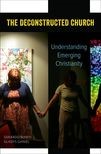 The Deconstructed Church: Understanding Emerging Christianity
The Deconstructed Church: Understanding Emerging Christianity
Contents
-
-
-
-
-
-
-
-
-
-
Persistent Questions Regarding the Emerging Church Movement Persistent Questions Regarding the Emerging Church Movement
-
Evangelicals in Disguise? Evangelicals in Disguise?
-
Liberal Protestants? Liberal Protestants?
-
Religious Consumers? Religious Consumers?
-
The Emerging Church is Dead? The Emerging Church is Dead?
-
-
Persistent Characteristics of the Emerging Church Movement Persistent Characteristics of the Emerging Church Movement
-
The Emerging Church Movement is a Transnational Network The Emerging Church Movement is a Transnational Network
-
The Emerging Church Movement is Centered on Religious Individualization The Emerging Church Movement is Centered on Religious Individualization
-
The Emerging Church Movement Supports a “Legitimate” Religious Self The Emerging Church Movement Supports a “Legitimate” Religious Self
-
The Emerging Church Movement Builds on a Sacralized Self The Emerging Church Movement Builds on a Sacralized Self
-
The Emerging Church Movement Promotes Religious Heterogeneity The Emerging Church Movement Promotes Religious Heterogeneity
-
-
The Emerging Church Movement is a Religious Fulfillment of Cooperative Egoism The Emerging Church Movement is a Religious Fulfillment of Cooperative Egoism
-
The Future of Emerging Christianity The Future of Emerging Christianity
-
-
-
7 Understanding Emerging Christianity
Get access-
Published:May 2014
Cite
Abstract
The Emerging Church Movement (ECM) is best understood as an intriguing reshaping of religious imperatives and the efforts to put them into practice. The book not only synthesizes the broader argument of the book but also places it in contrast to common interpretations of the ECM, such as that it is merely evangelicalism in disguise, liberal Protestantism in another guise, religious consumerism, or a movement that has already run its course. The book argues that the structure and practices of Emerging Christianity represent a distinctive approach to religious individualization. We describe the religious orientation or “self” of the Emerging Christian as “legitimate,” “sacralized,” and “pluralist,” which is supported by congregations that facilitate a cooperative egoism. Emerging congregations provide settings where pluralism is embraced and where the otherwise isolated self can find meaning and fulfillment through others. In the ways it has responded to modernity, the ECM (and the other expressions of Christianity it may influence) is remarkably well-adapted to persist, even thrive, as a viable religious alternative in the West. And the patterns of religious individualism, the formation of pluralist congregations, the allowance for multiple forms of legitimate spirituality, and the desire to strategically construct a personal faith that is valid and strengthened by life lived in the real world will be a ubiquitous element of modern religiosity.
Sign in
Personal account
- Sign in with email/username & password
- Get email alerts
- Save searches
- Purchase content
- Activate your purchase/trial code
- Add your ORCID iD
Purchase
Our books are available by subscription or purchase to libraries and institutions.
Purchasing information| Month: | Total Views: |
|---|---|
| October 2022 | 1 |
| November 2022 | 5 |
| December 2022 | 2 |
| April 2023 | 2 |
| May 2023 | 2 |
| July 2023 | 5 |
| October 2023 | 3 |
| November 2023 | 2 |
| February 2024 | 2 |
| March 2024 | 4 |
| May 2024 | 5 |
| June 2024 | 2 |
| July 2024 | 4 |
| August 2024 | 3 |
| October 2024 | 6 |
| November 2024 | 3 |
| February 2025 | 2 |
Get help with access
Institutional access
Access to content on Oxford Academic is often provided through institutional subscriptions and purchases. If you are a member of an institution with an active account, you may be able to access content in one of the following ways:
IP based access
Typically, access is provided across an institutional network to a range of IP addresses. This authentication occurs automatically, and it is not possible to sign out of an IP authenticated account.
Sign in through your institution
Choose this option to get remote access when outside your institution. Shibboleth/Open Athens technology is used to provide single sign-on between your institution’s website and Oxford Academic.
If your institution is not listed or you cannot sign in to your institution’s website, please contact your librarian or administrator.
Sign in with a library card
Enter your library card number to sign in. If you cannot sign in, please contact your librarian.
Society Members
Society member access to a journal is achieved in one of the following ways:
Sign in through society site
Many societies offer single sign-on between the society website and Oxford Academic. If you see ‘Sign in through society site’ in the sign in pane within a journal:
If you do not have a society account or have forgotten your username or password, please contact your society.
Sign in using a personal account
Some societies use Oxford Academic personal accounts to provide access to their members. See below.
Personal account
A personal account can be used to get email alerts, save searches, purchase content, and activate subscriptions.
Some societies use Oxford Academic personal accounts to provide access to their members.
Viewing your signed in accounts
Click the account icon in the top right to:
Signed in but can't access content
Oxford Academic is home to a wide variety of products. The institutional subscription may not cover the content that you are trying to access. If you believe you should have access to that content, please contact your librarian.
Institutional account management
For librarians and administrators, your personal account also provides access to institutional account management. Here you will find options to view and activate subscriptions, manage institutional settings and access options, access usage statistics, and more.